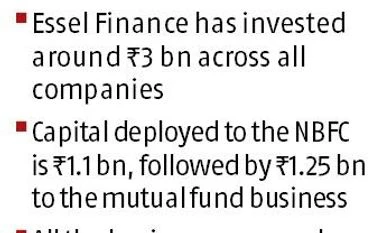At Essel Finance, a subsidiary of media baron Subhash Chandra’s Essel Group, plans to scale up operations are underway after the Reserve Bank of India (RBI) approved LKP Finance’s proposal to sell up to 62 per cent of its equity shareholding to Dakshin Mercantile Private Limited, another Essel Group company.
LKP Finance is an RBI registered non-banking finance company (NBFC) and is listed on the Bombay Stock Exchange.
Speaking to Business Standard, Amitabh Chaturvedi, MD and CEO of Essel Finance, says, “Our integration with LKP Finance and its potential benefits is contingent upon the successful completion of the open offer and regulatory approvals. The alignment with Essel Finance, possibility of funds infusion into Essel Finance companies, the change of name and registered office will happen only after the successful completion of the acquisition process, keeping the best interest of the stakeholders in mind.”
While there are various regulatory and compliance procedures that still require approval from the respective market and industry regulators, the main holding company at present, Essel Finance, is controlled entirely by the Chandra family.
In order to complete the acquisition of LKP, the company may need to raise or proffer Rs 1.7 billion to purchase the 62 per cent stake, under an open offer sale. In structural terms, the company has set up seven special purpose vehicles (SPVs) under Essel Finance—for housing finance, mutual fund, NBFC, private equity, wealth advisory, investment banking and foreign exchange activities.
Each of these SPVs is licensed and registered with the RBI, National Housing Bank, Insurance Regulatory and Development Authority or the Sebi, whichever
applicable. Currently, the total value of capital deployed to the NBFC stands at Rs 1.1 billion, followed by Rs 1.25 billion to the mutual fund business and Rs 200 million to the housing finance company (HFC).
In the housing finance business, Chaturvedi said: “We are not going too much into the affordable segment but will sell Pradhan Mantri Awas Yojana loans as no HFC in India can afford to ignore that segment.”
Our offering for loans will not cross Rs 2.2 million and nothing below Rs 500,000. We may not be a meaningful player in metros like Mumbai, but our target customers are mainly in suburb areas like Virar and Thane.
“The capital comes into the holding company and gets distributed to the SPVs depending on their capital requirement. All the businesses are cash positive, other than the mutual fund, and we have invested around Rs 3 billion across all the companies,” said Chaturvedi.
The plan is to integrate all these businesses under one banner, Essel Finance. While the main company will be entirely owned by the Chandra family, the SPVs will continue to be 100 per cent subsidiaries of the holding company and could have external shareholders.
Chaturvedi said that the NBFC, private equity and investment banking (to a lesser extent) will focus of financing mid-sized corporates. “We cannot facilitate large transaction like other NBFCs for corporates,” he said.
In the housing finance business, Chaturvedi said the plan to take the builder-financing route and use sales agents to sanction loans, which as an ‘asset-light’ model, will provide the company with some operation efficiencies as and when lending operations scale.
“We are not going too much into the affordable segment but will sell Pradhan Mantri Awas Yojana loans as no HFC (housing finance company) in India can afford to ignore that segment. Our offering for loans will not cross Rs 2.2 million and nothing below Rs 500,000. We may not be a meaningful player in metros like Mumbai, but our target customers are mainly in suburb areas like Virar and Thane.
“This is the best period for financial services companies in the country, provided you price your risk very well. For both the HFC and mutual funds, business growth from Tier-2 and Tier-3 cities and towns will be the driver for the future,” Chaturvedi said.
Unlock 30+ premium stories daily hand-picked by our editors, across devices on browser and app.
Pick your 5 favourite companies, get a daily email with all news updates on them.
Full access to our intuitive epaper - clip, save, share articles from any device; newspaper archives from 2006.
Preferential invites to Business Standard events.
Curated newsletters on markets, personal finance, policy & politics, start-ups, technology, and more.
)